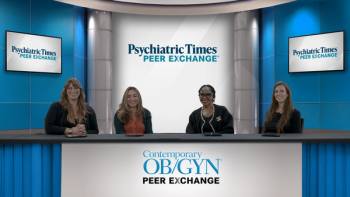Articles by Alison Reminick, MD

Postpartum Depression Resources for Providers and Patients
ByJoy Baker, MD, FACOG, PMH-C, C-EFM, MT (ASCP) ,Elizabeth Johnson, RN, APRN, PMH-C ,Alison Reminick, MD ,Kelly Devine Arch, DNP, CNM, PMHNP-BC, CLC Experts discuss that Postpartum Support International is an invaluable resource offering education, training, and support to clinicians and families, while emphasizing the importance of strong local specialist networks for warm handoffs and streamlined referrals; combined with routine, repeated screening and proactive follow-up, these practices help reduce stigma and improve timely, compassionate care for perinatal mood disorders throughout pregnancy and postpartum.

Treatment Options and Monitoring Treatment Response in Postpartum Depression
ByJoy Baker, MD, FACOG, PMH-C, C-EFM, MT (ASCP) ,Elizabeth Johnson, RN, APRN, PMH-C ,Alison Reminick, MD ,Kelly Devine Arch, DNP, CNM, PMHNP-BC, CLC Experts discuss that recent FDA-approved treatments like zuranolone offer rapid relief for postpartum depression, transforming care by enabling shorter, more effective pharmacologic courses; combined with tailored medication strategies, psychotherapy, and practical support around sleep and feeding, these advances promote comprehensive, individualized management that addresses both clinical symptoms and everyday challenges faced by new mothers

Treatment Barriers and Key Elements of Successful Treatment Plans in Postpartum Depression
ByJoy Baker, MD, FACOG, PMH-C, C-EFM, MT (ASCP) ,Elizabeth Johnson, RN, APRN, PMH-C ,Alison Reminick, MD ,Kelly Devine Arch, DNP, CNM, PMHNP-BC, CLC Experts discuss that limited access to qualified prescribers, particularly in underserved areas, remains a major barrier to timely pharmacologic treatment for perinatal mental health, underscoring the need for collaborative care models that combine thoughtful assessment, supportive interventions like sleep and therapy, and ongoing follow-up to ensure individualized, effective management.

Managing Postpartum Depression in Clinical Practice
ByJoy Baker, MD, FACOG, PMH-C, C-EFM, MT (ASCP) ,Elizabeth Johnson, RN, APRN, PMH-C ,Alison Reminick, MD ,Kelly Devine Arch, DNP, CNM, PMHNP-BC, CLC Experts discuss that after a positive screen for perinatal mood or anxiety disorders, timely and compassionate intervention—through trusted resources like Postpartum Support International, thoughtful medication and therapy options, and patient-centered education that addresses stigma and supports shared decision-making—is key to achieving meaningful recovery and improved parent-infant outcomes.

Improving Patient Communication in Postpartum Depression
ByJoy Baker, MD, FACOG, PMH-C, C-EFM, MT (ASCP) ,Elizabeth Johnson, RN, APRN, PMH-C ,Alison Reminick, MD ,Kelly Devine Arch, DNP, CNM, PMHNP-BC, CLC Experts discuss that reducing stigma, normalizing mental health conversations from the first prenatal visit, expanding access through integrated and virtual care, and addressing systemic barriers through education, collaboration, and policy reform are all critical strategies for improving the detection and treatment of perinatal mood and anxiety disorders.

Screening and Referral Recommendations in Postpartum Depression
ByJoy Baker, MD, FACOG, PMH-C, C-EFM, MT (ASCP) ,Elizabeth Johnson, RN, APRN, PMH-C ,Alison Reminick, MD ,Kelly Devine Arch, DNP, CNM, PMHNP-BC, CLC Experts discuss that while standardized screening tools are important for detecting perinatal mood and anxiety disorders, true identification often relies on provider intuition, meaningful dialogue, and cross-specialty collaboration—especially in pediatric settings—to ensure timely support for both parent and child.

Collaborative Role of Providers for Screening, Diagnosis, and Referrals in Postpartum Depression
ByJoy Baker, MD, FACOG, PMH-C, C-EFM, MT (ASCP) ,Elizabeth Johnson, RN, APRN, PMH-C ,Alison Reminick, MD ,Kelly Devine Arch, DNP, CNM, PMHNP-BC, CLC Experts discuss that effective management of perinatal mood and anxiety disorders in primary care and obstetrics requires routine screening, clear referral pathways, provider education, and collaborative care to ensure timely diagnosis and treatment.

Risk Factors for Postpartum Depression
ByJoy Baker, MD, FACOG, PMH-C, C-EFM, MT (ASCP) ,Elizabeth Johnson, RN, APRN, PMH-C ,Alison Reminick, MD ,Kelly Devine Arch, DNP, CNM, PMHNP-BC, CLC Experts discuss that while anyone can experience perinatal mood and anxiety disorders, individuals with personal or family mental health histories, recent trauma, or medication changes are at higher risk, and emphasize the critical importance of informed, individualized medication management during pregnancy and lactation to balance risks, prevent undertreatment, and ensure the well-being of both parent and child.

Impact on Quality of Life in Postpartum Depression
ByJoy Baker, MD, FACOG, PMH-C, C-EFM, MT (ASCP) ,Elizabeth Johnson, RN, APRN, PMH-C ,Alison Reminick, MD ,Kelly Devine Arch, DNP, CNM, PMHNP-BC, CLC Experts discuss how perinatal mental health disorders can significantly impact not only the birthing individual but also parenting capacity, partner relationships, and child development, emphasizing the need for a holistic, trauma-informed, and family-centered approach that addresses the mental health needs of both parents, supports household well-being, and mitigates long-term risks for children.

Recognizing and Differentiating Postpartum Depression
ByJoy Baker, MD, FACOG, PMH-C, C-EFM, MT (ASCP) ,Elizabeth Johnson, RN, APRN, PMH-C ,Alison Reminick, MD ,Kelly Devine Arch, DNP, CNM, PMHNP-BC, CLC Experts discuss the importance of recognizing that perinatal mood and anxiety disorders (PMADs) can emerge before, during, or after pregnancy—often influenced by factors like pregnancy intention—and emphasize the need for comprehensive, nuanced diagnosis and holistic care that extends beyond postpartum depression to include anxiety, obsessive-compulsive disorder, posttraumatic stress syndrome, and other conditions, ensuring timely identification and support throughout the entire perinatal period.

Defining Postpartum Depression
ByJoy Baker, MD, FACOG, PMH-C, C-EFM, MT (ASCP) ,Elizabeth Johnson, RN, APRN, PMH-C ,Alison Reminick, MD ,Kelly Devine Arch, DNP, CNM, PMHNP-BC, CLC Experts discuss how perinatal mental health conditions—including postpartum depression, which is distinct from transient postpartum blues—require careful clinical differentiation, precise assessment, and individualized care, emphasizing the importance of expanding awareness, reducing stigma, and ensuring early, multidisciplinary intervention to support patient well-being and functional recovery.

